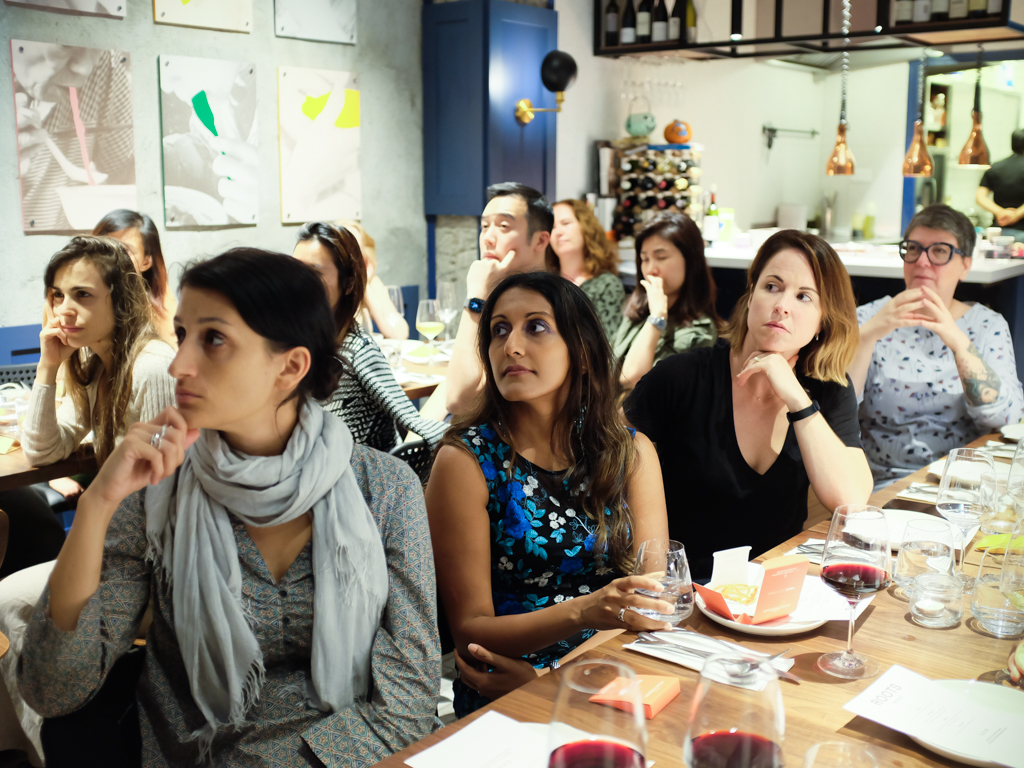7 Mins Read
Vol. 5 of our #PlantBased Dinner Series at Roots was another sold-out, hugely inspiring success, highlighting Goal #12 of Responsible Consumption & Production with a talk by Hong Kong charity Redress and a special gift from British sustainable brand BOTTLETOP‘s SDG charity campaign TOGETHERBAND. At the core of each of our dinner series is to highlight one of the 17 United Nations Sustainable Development Goals (SDGs), which are not only important in their own right, but especially pertinent in Asia where we’re seeing a regression on key targets. By bringing together the community, featuring a Global Goal and sparking meaningful conversations over delicious vegan food, Green Queen hopes to springboard positive actions that can make the world a better place.
During the Vol.5 dinner hosted by Roots in Wan Chai’s Starstreet Precinct, we focused on the Global Goal 12: Responsible Production & Consumption, which is at the heart of our everyday decisions as consumers. While the facts shared were shocking and hard to swallow at times, it’s gratifying to think about how personal Goal 12 is for all of us. EVERY DAY, we make purchasing decisions. We vote with our dollar. We buy food, clothing, personal care, household items, toys, presents…the list is endless. We can choose to support Goal 12 with EVERY purchase by choosing a brand/product that supports responsible production. We as individuals have the power to effect change and create impact.
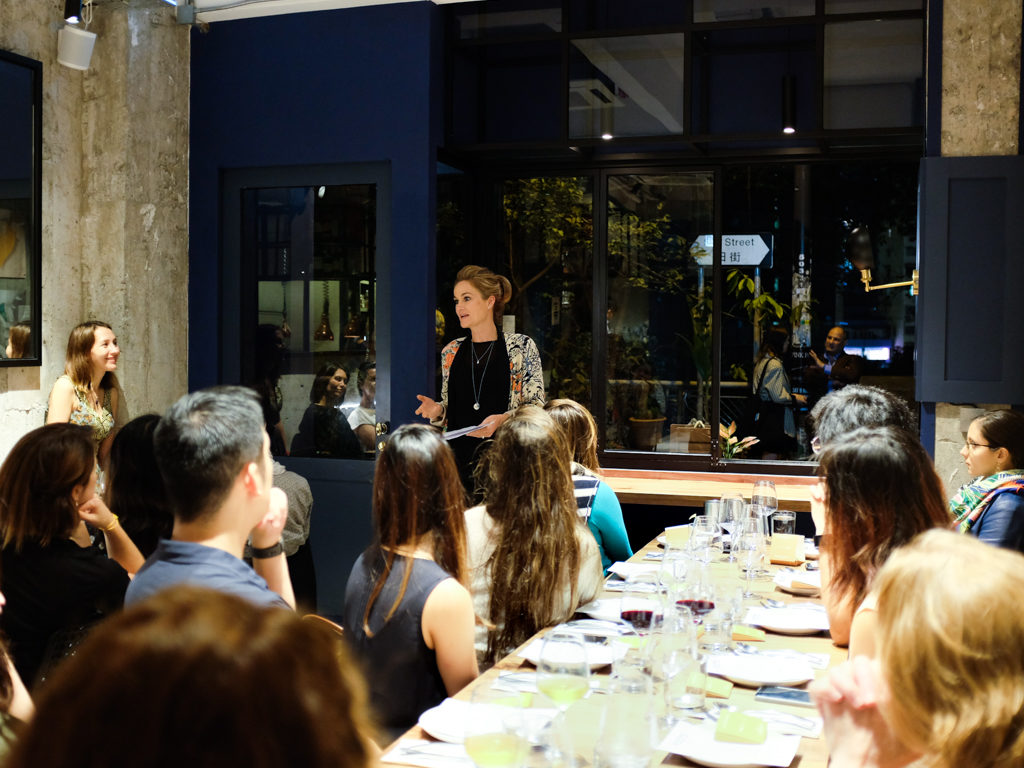
We were lucky to have a very special speaker for the evening, Anneleise Smillie, Executive Director at Redress, the Hong Kong-based Asia NGO focused on alleviating the pollution and waste generated by the fashion industry. Redress is the original Goal 12 NGO in the region and they have been raising awareness and helping to create change for over a decade. Before the dinner started, Anneleise presented some of the important work Redress does to promote responsible production and consumption within the fashion industry in Hong Kong and globally.
Fashion is at the crux of this, and many other Global Goals – from animal welfare to deforestation and resource use, the fashion industry touches every aspect. Redress takes in garment donations year round, which goes through a meticulous sorting process, and they also organize the Redress Design Awards, the world’s largest sustainable fashion design competition, where upcoming fashion designers from around the world compete annually for the top prize. Motivated by the understanding that much of the waste produced in the industry supply chain can be curbed during the design process, Redress supports education and training for designers creating upcycled sustainable fashion collections.
To put into perspective the enormous impact of fashion, an area where most of us spend money regularly, Anneleise presented some stark figures: the industry is responsible for 10% of our global carbon emissions, greater than shipping and aviation combined. Over a quarter of the world’s chemicals produced are used in creating fashion garments, making fashion only second to agriculture as the biggest water polluter in the world.
As many as 40% of textiles are wasted at the production level, never to be turned into clothing and instead sent to landfill or incineration. In 2014, the amount of clothing produced globally reached an astonishing 100 billion garments, and this number is set to double by 2030. Worse still, by 2050 the fashion industry will make up 26% of the global carbon budget.
Anneleise opened our eyes to the environmental damage that the “simple act of getting dressed” is doing to Hong Kong. Every day, we send 370 tonnes of textile waste to our landfills. That’s the equivalent of 1 and a ½ Big Buddhas. In a survey conducted by Redress and other NGO partners, 4 out of 10 Hong Kongers admitted to throwing away a piece of clothing after wearing it just once.
With the local and global appetite for fast fashion, which churns out new trendy clothing season after season (some brands now 12 collections a year instead of 2), not showing any signs of slowdown, our individual choices – to either help the cause or exacerbate the crisis matter now more than ever before. “We must join in to help “dismantle the current system and move towards a circular model,” Anneleise called on the engaged crowd.
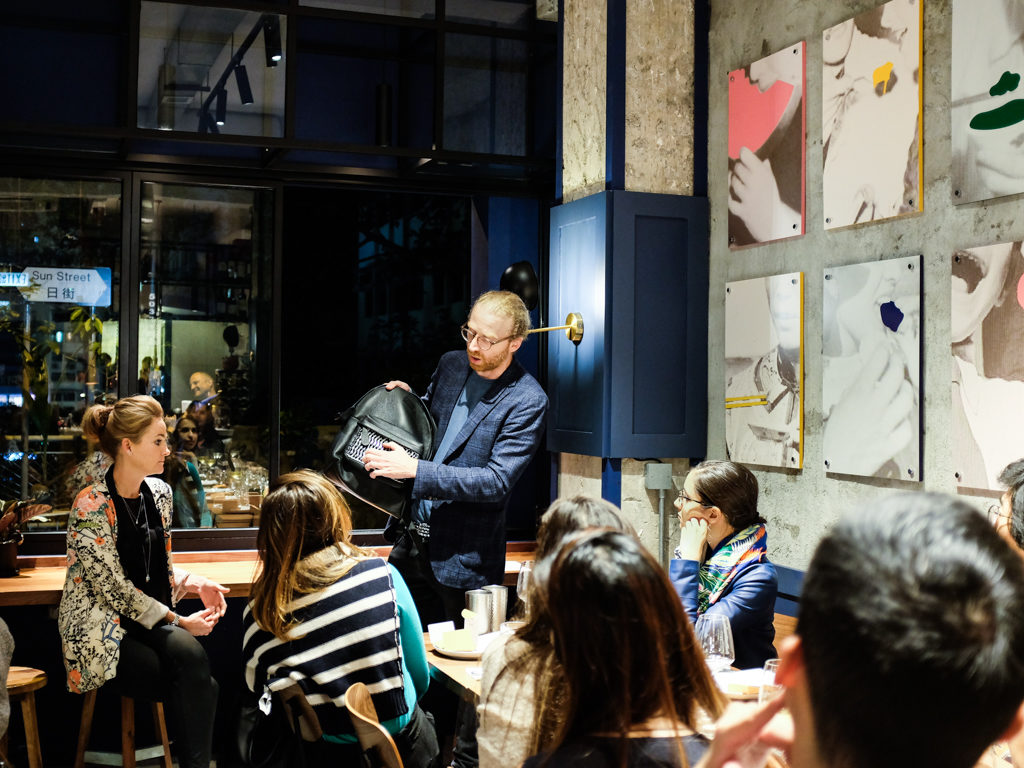
Our guests also heard from Oliver Wayman, co-founder of British luxury sustainable accessory brand BOTTLETOP and founder of UN SDG charity initiative #TOGETHERBAND. TOGETHERBAND partnered with Green Queen to gift dinner attendees a #TOGETHERBAND pack, a sustainably-made upcycled friendship bracelet. Each friendship bracelet pack corresponds to one of the UN global goals, and is made using ocean plastic from Costa Rica and melted-down reclaimed illegal firearms from El Salvador.
Wayman’s mission is to engage 1 billion individuals about the UN Global Goals. “Through this campaign, we want to inspire individuals to work together towards the Global Goals. We’re already seeing this underway in Hong Kong, where people are engaged in the process of knowing where products are being made, and what materials they are made from…Rethinking our own consumption habits might seem small, but like other seemingly tiny things – such as participating in this plant-based dinner event – there is a huge impact to be made. It won’t be a step change overnight, but there is a gradual change over time,” said Oliver.
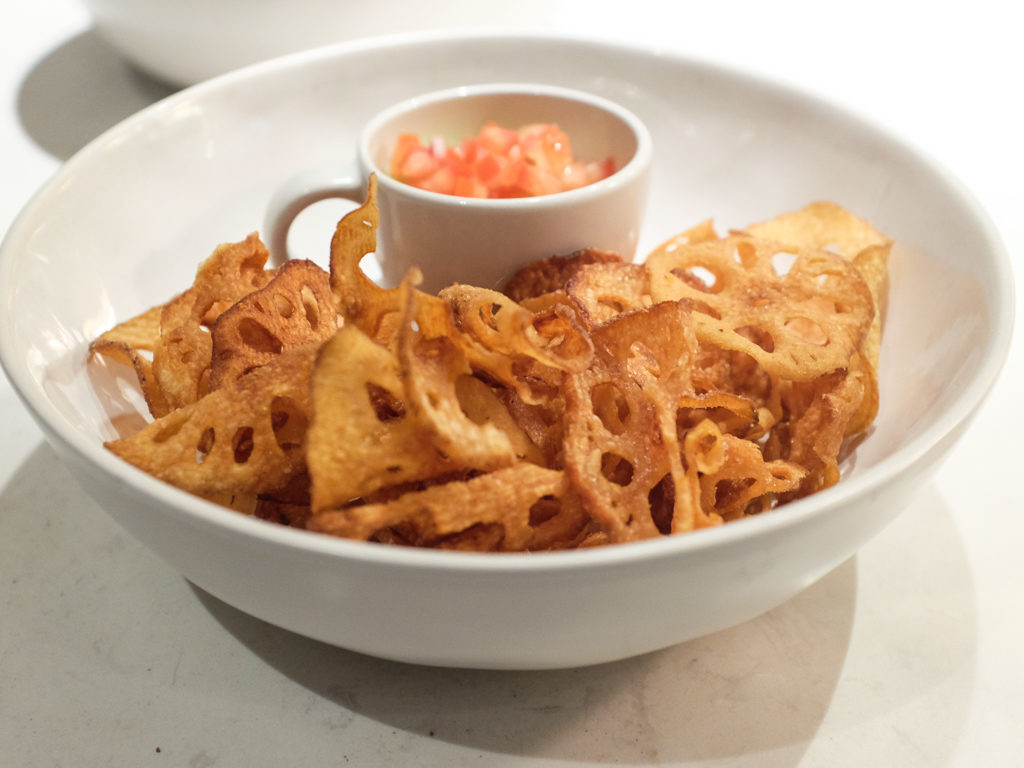
During the course of the evening, our guests enjoyed a 5-course tasting menu by Roots made entirely from plants. This is at the core of each of our dinners in the series – to showcase creativity within vegan cuisine and to remind our guests that choosing plants at the dinner table is the most impactful personal decision that each of us can make to reduce our carbon footprint on earth.
Highlighting fresh produce sourced from local farmers, Hong Kong Tatler’s T.Dining nominee Chef Stephanie Wong presented dish after dish to shine a light on plant ingredients that were cooked up with classic French flair buttressed unique Cantonese twist.
After being welcomed with Italian wine, we were treated to addictive crispy Lotus Root Chips served with a refreshing soy-avocado guacamole. Next was a colourful Roasted Heirloom Root Vegetable Salad (the purple carrots were particularly sweet) and a truly one-of-a-kind Canto-French dish – Yunan Morels with Soybean Hummus & Chilli that was bursting with flavour and the perfect amount of spice.
The French Girolle & Chinese Shiitake Mushroom Barley was a bowl of warming comforting fare, topped with pan-fried shallots and a nutty tahini sauce that paired perfectly with the grains. We rounded off the meal with we finished off our plant-based food journey of the night with Roots’ specially crafted Vegan Chocolate Tart with Salted Oat Crust.
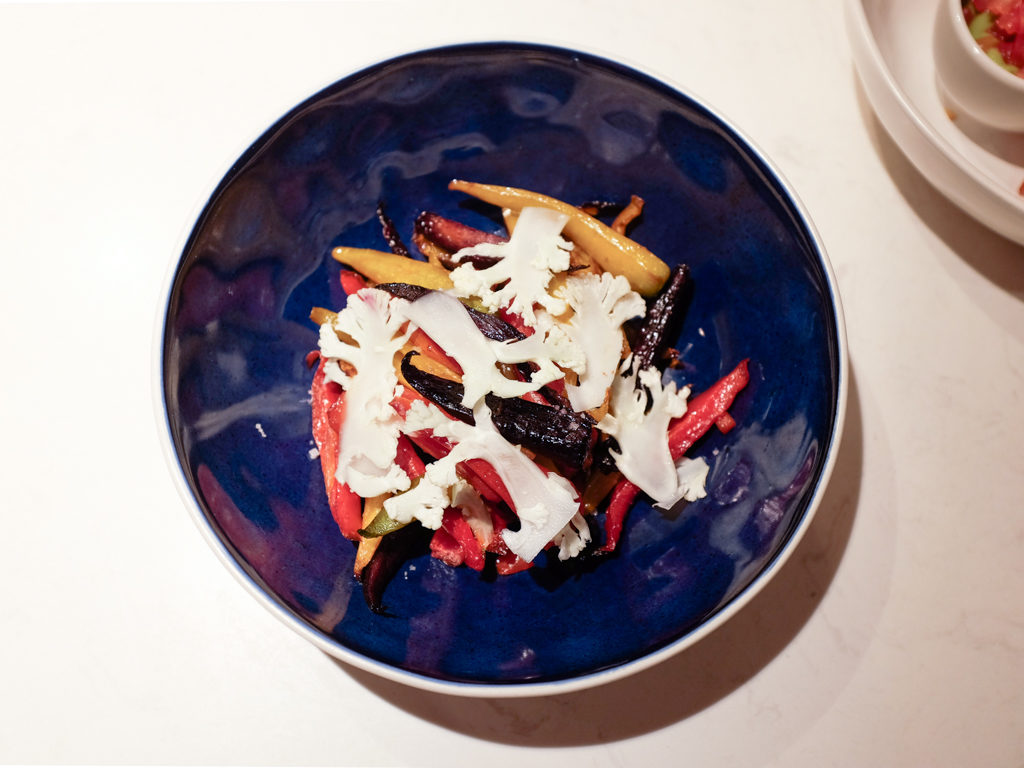
First giving French cuisine a local twist, and now having debuted at our dinner her plant-based creations, Chef Stephanie Wong told us a bit about the exciting culinary journey this has taken her on: “We’ve always had vegetarian and vegan dishes at Roots – it’s in our name, inspired by root vegetables. But with this, we’ve challenged ourselves even more with an entire plant-based menu that wouldn’t compromise on taste, incorporating local Hong Kong plant ingredients with French flavours. We’re really proud of it. I wanted to create flavours that would remind diners of something foreign yet local at the same time.”
We left the event feeling empowered to make changes in our daily lives, knowing the impact that we can collectively make for a better, more sustainable planet.
Tips From Anneleise Smillie On How You Can Take Action On Global Goal #12:
- Buy less, and choose well: We need to start asking ourselves, do we really need that product? Will we wear this piece of clothing more than 30 times, and ask yourself again before you buy.
- Consumer care: Think about spot cleaning instead of throwing clothes into the washing machine, invest in filters to capture microplastic fibres from contaminating waterways and ditch the fabric softener.
- Repair your items: Instead of throwing away something that is broken, think about whether you can send it to a repair shop or mend it yourself to extend its life cycle.
- Support circular models of consumption: Whether it be secondhand, rental or upcycled (like The R Collective and BOTTLETOP), we need to be voting with our dollar for those businesses that have already ditched the unsustainable linear economic system.
- Use your voice: Ask manufacturers and big companies what they are doing to make their operations more eco-friendly. Write to them – words are the ammunition that company leaders need to convince shareholders that sustainable is the only way to go.
If you joined us for our fifth edition, we hope you had as empowering a time as we did. We’re taking December off, but Vol. 6 will be back in early 2020, so get ready. To keep posted and make sure you never miss out on our UN SDG #PlantBased Dinner Series, make sure to follow Green Queen and sign up to our newsletter.
All images courtesy of Green Queen.

